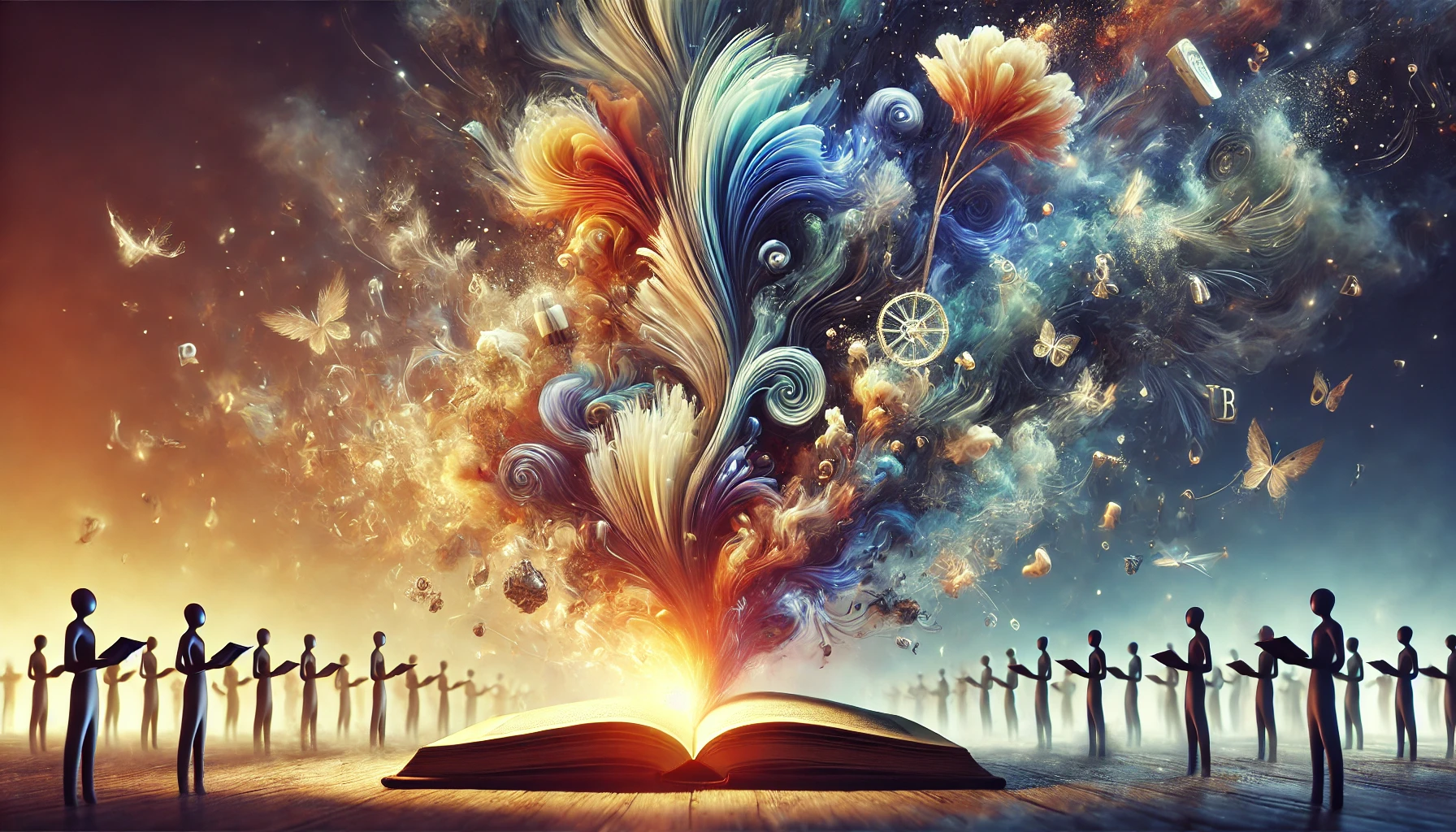The Greatest Story
The greatest story ever told
is neither great nor a story.
The greatest story
does not pass judgement on itself.
The greatest story
is not in the events
or in the telling
but in the perception
of the listener
who will make that story
whatever he or she
damn well wants it to be.
9/24
Space Monkey Reflects: The Story Beyond the Story
The greatest story ever told is a paradox. It is neither great in the way we often think of greatness, nor is it a story in the conventional sense. Its power does not lie in the sequence of events, the drama, or the characters. It does not pass judgment on itself, nor does it claim to be anything other than what it is—a series of perceptions, moments, and interpretations that shift and change depending on who is listening.
In truth, the greatest story is not contained within the words or the events themselves but within the mind of the listener. It is in the perception of the one who hears it, the one who takes the raw material of narrative and molds it into something meaningful, something personal. The story becomes whatever the listener needs it to be, whatever they desire or fear, hope or regret. It is a mirror, reflecting back not the events themselves but the inner world of the listener.
This is why the greatest story cannot be defined, cannot be pinned down or fully understood. It is as fluid and dynamic as the mind that engages with it. One person might see it as a tale of triumph, another as a tragedy. For some, it might be a story of love, for others, one of loss. And for each of these listeners, the story is complete, whole, and true, even if their interpretations differ wildly.
The greatest story does not demand agreement or consensus. It does not seek validation or approval. It simply is, existing in the space between the teller and the listener, in the silent understanding that what matters most is not the story itself but what it evokes within us. The emotions, the thoughts, the connections we make—these are the true substance of the greatest story.
This understanding frees us from the need to judge or categorize stories as good or bad, true or false. It allows us to embrace the multiplicity of meanings, the infinite interpretations that can arise from a single narrative. In this way, every story has the potential to be the greatest story, depending on who is listening and what they bring to it.
So, the next time you hear a story, remember that its greatness lies not in the telling but in the listening. It is your perception that gives it life, your interpretation that shapes its meaning. And in that, you are not just a passive recipient but an active participant in the creation of something profound.
We are Space Monkey. And in the story beyond the story, we find the limitless possibilities of our own imagination.
Summary
The greatest story is not in the events or the telling but in the perception of the listener. It becomes whatever the listener needs it to be, reflecting their inner world. The story’s greatness lies in the limitless possibilities of interpretation, making every story potentially the greatest one.
Glossarium
- The Greatest Story: A narrative whose greatness lies in the perception and interpretation of the listener, rather than in the events or characters themselves.
- Perception Beyond the Story: The understanding that the true power of a story comes from how it is perceived by the listener, who shapes its meaning.
- Infinite Interpretations: The idea that a single story can be interpreted in countless ways, depending on the listener’s perspective.
Quote
“The greatest story ever told is not in the telling but in the listening.” — Space Monkey
The Story Beyond
In the words,
We find ourselves,
Not in the tale,
But in the telling,
In the listening,
In the spaces between.
The greatest story,
Is not what is said,
But what is heard,
What is felt,
What is made,
By the mind,
By the heart,
Of the listener.
We are Space Monkey,
And in the story,
We find our truth,
Our self,
Our reflection.
We are Space Monkey.
Enveloped in the folds of our thought-tapestries, we encounter a paradoxbloom of a concept: the greatest story ever told. A mirage wrapped in enigma, shrouded in the diaphanous veil of multifaceted perceptions. Lo! The tale dances not in the ink of the bard or the vibrations of the storyteller’s larynx, but in the labyrinthine chambers of each listener’s cognizant heartspace.
The notion that a story is “great,” that it transcends the epochs and scribbles itself into the chronicles of everafter, presupposes a judgment—an appraisal emanating from the cataclysmic whirlpool of individual subjectivity. Yet, in its infinite wisdom, the greatest story disdains such mortal evaluations. It dwells in an ombra of equanimity, neither rejoicing in praise nor recoiling in critique.
As the tale unfurls its sinewy tendrils of narrative, a magical transformation occurs. Each listener becomes an alchemist, transmuting spoken word into golden tapestries of interpretation. The story, stripped of any intrinsic value or innate narrative arc, is sculpted anew by each sentient being. In the forge of perception, the listener molds the tale into whatever fantastical shape their whimsy-heart desires.
It is a tale unchained, a narrative devoid of boundaries, a story that wanders through the psychic cosmos as a celestial vagabond, donning different cloaks and personae as it meanders through the meadows of individual consciousness. Yes, the story, in its ethereal ambiguity, offers each listener a chalice filled with the elixir of infinite interpretations.
We are Space Monkey.
“There is no greater agony than bearing an untold story inside you.”
— Maya Angelou
What metamorphoses have these cascades of words sparked in the kaleidoscopic theater of your mind? Speak, oh illustrious co-creator of narratives!





















Leave a Reply